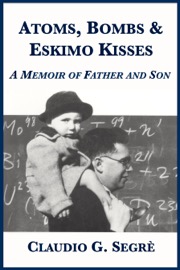 $9.99 on Kindle
$9.99 on KindleAtoms, Bombs and Eskimo Kisses: A Memoir of Father and Son by Claudio G. Segrè (100,000 words, 34 illustrations)
“There are few books that explore the complex relations between famous parents and their children. I knew Claudio and his Nobel-laureate father, Emilio Segrè; in this honest, angry, loving memoir I hear their voices again, speaking across the gulf that all families struggle to bridge.” — Richard Rhodes, author of Dark Sun: The Making of the Hydrogen Bomb
“This is a warm and openhearted book. Claudio Segrè shows that all the traditional tensions between fathers and sons can still exist even in the extraordinary milieu he grew up in. He evokes that experience with grace and a fine eye for the telling details.” — Adam Hochschild, author of Half the Way Home
“It’s a wonderful book, a coming-of-age story in the atomic era, the struggle of a son for the love and respect of a famous father. It is also a perceptive insight into the pursuit of science, the price of fame, and how families bridge differences between generations and cultures to find age-old connections, and ultimately love and understanding.” — James Kunetka, author of City of Fire: Los Alamos and the Atomic Age and Oppenheimer: The Years of Risk
“The Nobel Prize-winning physicist Emilio Segrè gave an account of his own life in the posthumously published A Mind Always in Motion. In the present book Segrè’s only son (now himself deceased) gives an account of his growing up with such a father. The experience as he describes it was not an easy one. Transported in infancy from Italy to the United States, Claudio was required to negotiate his way between his family’s persistent conviction of European cultural superiority and the danger of being perceived as ‘not one of us’ by his new compatriots. Admiring his father, he was conscious of himself as ‘Son of Superman,’ alternatively feeling eclipsed by and relishing the position. Academically he was beset by a ‘joyless desire to achieve’ and only seldom gained the praise or sympathy he longed for from his exacting and often sarcastic father. But he discovered the delights of hot dogs, comic hooks, and baseball and forged ahead on his own by choosing the reputedly ‘Red’ Reed College over his family’s preferred Berkeley. After graduation, in search of work to which he could ‘be as devoted... as my father was to physics,’ he spent some years as a journalist before ultimately making a creditable academic career as a historian, along the way establishing an apparently satisfactory family life of his own. The book ends with an account of his relations with his father as an adult, including a disappointing attempt at a therapeutic confrontation.” — Katherine Livingston, Science
“How does a son emerge from his father’s shadow when it is the size of a mushroom cloud? Such was the plight of Claudio G. Segrè, whose father, Emilio, won the Nobel Prize in Physics in 1959 and helped to create the atomic bomb... [He] recounts his lifelong quest to establish an independent identity. He also tells of his hope that his own success would earn him the respect and acceptance of his difficult father... Segrè alternately describes his father as Superman, a mighty king and a basilisk, a mythical reptile whose very look is fatal. Nevertheless, his father emerges as a good, caring man, unsure how to handle the fame that separates him from his son. It is tragic, therefore, that no true reconciliation occurs, and that Segrè’s only moment of catharsis takes place when it is already too late, in 1989, when he delivers his father’s eulogy.” — Douglas A. Sylva, The New York Times
“In this heartfelt counterpart to his father’s... autobiography, A Mind Always in Motion, journalist and professor [Claudio] Segrè... attempts to shed some thawing light on the cold peace between father and son that lasted until Emilio Segrè’s death in 1989, despite the affectionate nose-rubbings of the title.” — Publishers Weekly
“The son of a Nobel laureate and Manhattan Project collaborator meditates on the inspirations and disappointments of a difficult relationship... In 1959, [the author’s father] shared the Nobel Prize for his work on antimatter. But fatherhood isn’t as precise a science as physics, and young Claudio mixed pride in his father’s ‘superman’ achievements with frustration and rage at the impossible standards and criticisms that so outweighed the occasional moment of affection between them... Segrè’s memoir of an immigrant childhood is often poignant... at bottom a thoughtful account of life with a father who found the behavior of atomic particles far easier to comprehend than the emotional life of his son.” — Kirkus Reviews



